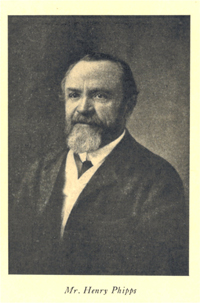 Hospital trustee HENRY PHIPPS, along with his wife, supported the establishment at Hopkins of the Henry Phipps Psychiatric Clinic, the nation’s first inpatient facility for the mentally ill constructed as part of an acute care hospital. In 1908 the Pittsburgh industrialist offered to fund construction of a clinic and to create a professorship in psychiatry. In 1913 the Phipps Clinic opened, and in 1923 Mr. and Mrs. Phipps gave a substantial gift to endow the clinic, stipulating that their gift was to be matched by other sources. In 1925 Adolf Meyer, psychiatrist-in-chief and chairman of the Department of Psychiatry, was designated as the first Henry Phipps Professor of Psychiatry. Dr. Meyer, who was originally trained in neurology, guided his department toward research in the biological foundations of mental disease and trained many leaders in academic psychiatry. The emergence of Hopkins as the preeminent location for the scientific study of psychiatry was due in large part to the leadership of Dr. Meyer and the generosity of Mr. Phipps, who died in 1930.
Hospital trustee HENRY PHIPPS, along with his wife, supported the establishment at Hopkins of the Henry Phipps Psychiatric Clinic, the nation’s first inpatient facility for the mentally ill constructed as part of an acute care hospital. In 1908 the Pittsburgh industrialist offered to fund construction of a clinic and to create a professorship in psychiatry. In 1913 the Phipps Clinic opened, and in 1923 Mr. and Mrs. Phipps gave a substantial gift to endow the clinic, stipulating that their gift was to be matched by other sources. In 1925 Adolf Meyer, psychiatrist-in-chief and chairman of the Department of Psychiatry, was designated as the first Henry Phipps Professor of Psychiatry. Dr. Meyer, who was originally trained in neurology, guided his department toward research in the biological foundations of mental disease and trained many leaders in academic psychiatry. The emergence of Hopkins as the preeminent location for the scientific study of psychiatry was due in large part to the leadership of Dr. Meyer and the generosity of Mr. Phipps, who died in 1930.
“We are very proud that the Phipps flame, lit in the name of psychiatric progress more than 100 years ago, continues to burn so brightly here and to shed so much light on our field, far and wide. ” – James B. Potash, MD, MPH
Held by James B. Potash

JAMES ‘JIMMY’ POTASH, MD, MPH, returned to Johns Hopkins as Director of Psychiatry and Behavioral Sciences and Psychiatrist-in-Chief in 2017. Prior to that he was Chair and Department Executive Officer of the University of Iowa Department of Psychiatry from 2011-17. There he strengthened research focused on the mechanisms of psychiatric illness, through the creation of a Division of Molecular Psychiatry, and through helping lead in the development of the Iowa Neuroscience Institute. He also introduced a research track in the residency, along with tracks for child, geriatric, and community psychiatry. He encouraged investigators to come together with clinicians and educators in teams that could tackle illness from several angles, which bore fruit in areas such as autism and intellectual disability, and neuropsychiatry.
Dr. Potash graduated in 1984 from Yale College, where he majored in English. Following graduation, he served in the Peace Corps in the West African country of Senegal, and there decided to become a physician. He completed his master’s degree in public health at Johns Hopkins, focusing on epidemiology and international health. He then went on to medical school at Hopkins, medical internship at Hopkins Bayview, and a year working as a general practitioner in another West African country, Benin. He returned to do his psychiatric residency at Hopkins and served as chief resident in 1997-98. He then joined Dr. Ray DePaulo’s mood disorders program, and eventually became the program’s research director before moving to Iowa. Dr. Potash’s work has focused on investigation of the genetic and epigenetic basis of mood disorders—depression and bipolar disorder. These efforts have resulted in over 170 publications and consistent NIH funding. He has been particularly interested in the genetic basis of the psychotic forms of bipolar disorder, and in the epi-genetic mechanisms through which stress plays a role in depression.
Dr. Potash co-leads the Bipolar Sequencing Consortium, and is a member of the Council on Research for the American Psychiatric Association. He serves as Treasurer for the International Society for Psychiatric Genetics, and he has played a leading role in the National Network of De-pression Centers.
In addition to his research endeavors, Dr. Potash is also an active clinician who sees mood disorders patients in the inpatient and outpatient settings.
 Hospital trustee HENRY PHIPPS, along with his wife, supported the establishment at Hopkins of the Henry Phipps Psychiatric Clinic, the nation’s first inpatient facility for the mentally ill constructed as part of an acute care hospital. In 1908 the Pittsburgh industrialist offered to fund construction of a clinic and to create a professorship in psychiatry. In 1913 the Phipps Clinic opened, and in 1923 Mr. and Mrs. Phipps gave a substantial gift to endow the clinic, stipulating that their gift was to be matched by other sources. In 1925 Adolf Meyer, psychiatrist-in-chief and chairman of the Department of Psychiatry, was designated as the first Henry Phipps Professor of Psychiatry. Dr. Meyer, who was originally trained in neurology, guided his department toward research in the biological foundations of mental disease and trained many leaders in academic psychiatry. The emergence of Hopkins as the preeminent location for the scientific study of psychiatry was due in large part to the leadership of Dr. Meyer and the generosity of Mr. Phipps, who died in 1930.
Hospital trustee HENRY PHIPPS, along with his wife, supported the establishment at Hopkins of the Henry Phipps Psychiatric Clinic, the nation’s first inpatient facility for the mentally ill constructed as part of an acute care hospital. In 1908 the Pittsburgh industrialist offered to fund construction of a clinic and to create a professorship in psychiatry. In 1913 the Phipps Clinic opened, and in 1923 Mr. and Mrs. Phipps gave a substantial gift to endow the clinic, stipulating that their gift was to be matched by other sources. In 1925 Adolf Meyer, psychiatrist-in-chief and chairman of the Department of Psychiatry, was designated as the first Henry Phipps Professor of Psychiatry. Dr. Meyer, who was originally trained in neurology, guided his department toward research in the biological foundations of mental disease and trained many leaders in academic psychiatry. The emergence of Hopkins as the preeminent location for the scientific study of psychiatry was due in large part to the leadership of Dr. Meyer and the generosity of Mr. Phipps, who died in 1930.